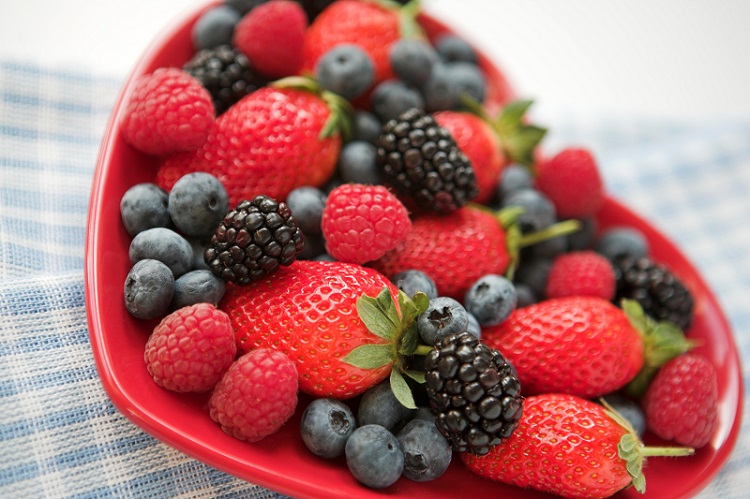6 Foods to Improve Your Heart Health

Heart disease is the leading cause of death for both men and women in the United States, according to the Centers for Disease Control and Prevention (1). Every year, 1 in every 4 deaths is caused by a heart-related disease.Amongst many risk factors, high cholesterol, high blood pressure, and smoking have been named most critical, and almost half of Americans can identify with at least one of them.
There are also several other lifestyle choices that are putting people at a higher risk of heart disease. Those include but not limited to poor diet, sedentary lifestyle, diabetes, overweight, and obesity. Fortunately, there are lifestyle changes that can help reverse the risk and serve as preventative measures.
And quite frankly, most of us already know what they are.
We know by now that it takes a heart-healthy diet and daily exercise to improve our heart health and lower the risk of many diseases including heart disease. Only, we wish if it was that easy. When it comes to exercise, luckily it’s somewhat straightforward:
It takes 150 minutes of cardio exercises a week to bring tremendous benefits to our heart, brain, and overall health.
But what about the healthy diet part with heart-supporting foods? Where do we start? What kind of foods should we eat on a heart-healthy diet?
With so many food choices available, it’s hard to know which ones will benefit our hearts the most. Since you can only eat so much every day, the very foods you base your heart-healthy diet are important. It’s a case where it pays to be selective. By choosing the right foods, you have a greater chance of reducing your risk of developing cardiovascular diseases, explains Julie Zumpano, RD, LD.
Zumpano adds a heart-healthy diet should include a great variety of fruits, vegetables, protein, and whole grain. Basically wholesome foods in their natural form. Altogether, she calls this diet “whole-foods diet.” Cornerstone foods are fish, whole grains, vegetables and plenty of fruits – foods particularly known to benefit the heart health. But don’t be mistaken; it’s not a diet so stoic that you are prohibited from anything and everything of indulgence. You can, in fact, enjoy an occasional glass of red wine or a piece of dark chocolate. Zumpano assures they all actually benefit the heart health. She suggests using the list below as a guide to creating health-focused meals and snacks.
To start, incorporate a few. Make small swaps.
Just a few simple swaps like going from pork chop to salmon for protein could make a big difference in improving your cardiovascular health.
Let’s take a look at other heart-healthy foods.
Fish: For protein, eat fish high in omega-3s, such as salmon, tuna, mackerel, herring, and trout. They help support your heart by preventing clotting, managing inflammation, and maintaining optimal levels of blood cholesterol and pressure.
Nuts: For a midday snack, a handful of healthy nuts such as almonds and walnuts can satisfy your hunger and help your heart. Like olive oil, nuts offer healthy monounsaturated fats that have been linked to an increase in good cholesterol called HDL.
Berries: Berries are packed with heart-healthy phytonutrients and soluble fiber. Try blueberries, strawberries, cranberries or raspberries in cereals or yogurt. Berries of many kinds such as strawberries, raspberries, and blueberries also contain polyphenols that are shown effective in dilating and relaxing blood vessels, which leads to lower blood pressure.
Flaxseeds: Flaxseeds contain omega-3 fatty acids, fiber, and phytoestrogens to boost and strengthen the heart. To allow the body to absorb those nutrients better, choose a ground or milled variety. Better yet, you can buy whole seeds and grind them at home. Also, not an equal exchange, but if you are a vegan or vegetarian, you can use flaxseeds as an alternate source of alpha-linolenic acid to help supplement your overall intake of omega 3 fatty acids.
Dark Chocolate: If you have a sweet tooth, then swap your usual scoop of ice cream or candy bar with a piece of dark chocolate. Foods such as dark chocolate and red wine have resveratrol, an antioxidant compound that helps prevent blood clot formation. Despite the benefit, it’s still recommended their consumption to be occasional at most.
Beans: Dark beans, such as kidney and black beans are high in fiber, B-vitamins, minerals, and other good stuff. They allow you to load up on protein without the unhealthy saturated fat you see in some animal-based proteins. Beans also help improve your blood cholesterol, which naturally lowers your risk for heart disease.
Takeaway:
Foods are preventative medicine. By basing your diet around nutrient-dense foods like the ones on the list above will make a big difference in the state of your cardiovascular health and help prevent the formation of heart disease. To get started, start incorporating some of the food items in your everyday meals. If a complete change in your diet is not sustainable, adding a few is even a good enough start.
To truly maximize the benefits, you can also add exercise. Cardio exercise, in particular, can lower your risk of cardiovascular diseases. 150 minutes of cardio is what’s recommended, but start with what you can then develop your plan to increase the duration and exercise intensity.
Story Credit: https://goodmenproject.com/featured-content/6-foods-to-improve-your-heart-health-lbkr/


